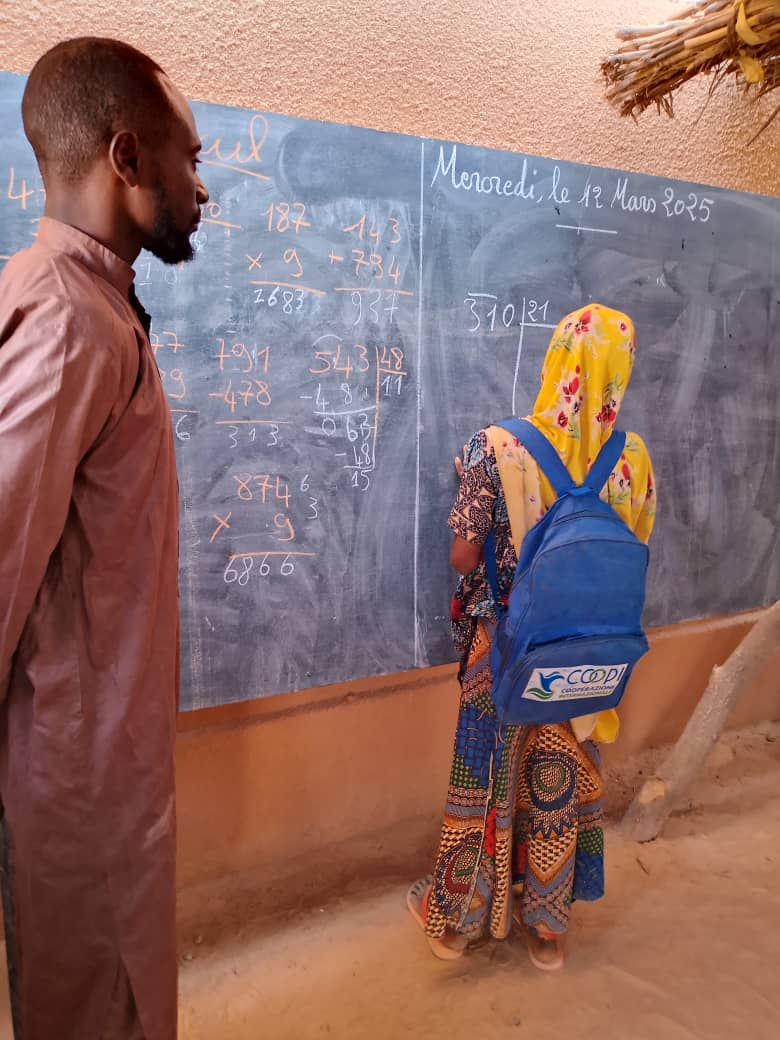06-05-2025 | di COOPI
Niger: Coopi's 'Accelerated Schooling program' as a tool for educational inclusion in fragile areas
In the fragile areas of Niger, the right to education remains a distant goal for many children. The situation is particularly critical in the Tahoua region, where over 50% of children between the ages of 7 and 16 are excluded from the school system. In this context of high vulnerability, initiatives such as the Accelerated Schooling / Bridge Program (SSA/P), promoted under the COOPI – Cooperazione Internazionale project "Rapid and Continuous Integrated Response in Education, Child Protection, Mental Health and Psychosocial Support for Children in Emergency Situations in the Sahel – Phase II", funded by European Humanitarian Aid (ECHO), are key tools to break the cycle of exclusion and promote equal educational opportunities.
The SSA/P program is an accelerated, non-formal educational model that enables out-of-school children (both boys and girls) aged 9 to 12, who have either never attended school or dropped out early, to reintegrate into the formal education system at the CE1 or CE2 levels (third or fourth grade of primary school) after 9 months of instruction and a final exam. This initiative offers a second chance to children who missed the opportunity to enroll —since in Niger, the age limit for starting first grade is set at 8 years old— and to those who were prematurely excluded from formal schooling.
The Tahoua region faces major challenges in terms of access to education and school dropout rates. More than 50% of children aged 7 to 16 are out of school, with significant geographical and socioeconomic disparities. Girls are particularly disadvantaged, with a primary school enrollment rate of 71% compared to 88% for boys. The main causes include household poverty, child labor, early marriage, and cultural perceptions that hinder girls' education. Inequalities between urban and rural areas, the distance to schools, inadequate infrastructure, and a shortage of qualified teachers further worsen the situation. Moreover, armed conflict and insecurity contribute to school closures and population displacement, obstructing access to education. In Tahoua, internally displaced children (IDPs) and refugees account for 23% of students in host schools, where dropout rates are high: 60% of these schools reported at least one dropout case during the 2023–2024 school year (REACH, May 2024). SSA/P classes are not only an educational springboard but also a potential catalyst for social change.
On October 1, 2023, thanks to the COOPI project, four SSA/P centers were opened—two in the Tillia department and two in the Bagaroua department of the Tahoua region—within four public primary schools (Bagaroua Eka, Akassou Folakawa, Tillia Quartier, and Telemces Traditionnelle), among the 13 schools targeted by the project. Each center hosted a group of 30 students, boys and girls, from host, displaced, and refugee communities. The aim was to provide quality education to a total of 120 registered children, including 54 girls and 66 boys, living in areas affected by the security crisis along the Mali border. The 9-month program included 65 local children (28 girls), 45 internally displaced children (22 girls), and 10 refugees (4 girls). All participants received a school kit including a backpack, notebooks, textbooks, pens, pencils, and erasers.
Alongside the educational dimension, the program provides continuous psychological and social support: a psychologist and a caseworker make regular visits to the centers to offer assistance to children in need. Four facilitators from the local community, including two women, were selected and trained to lead the classes using the SSA/P teaching methodology. This choice reflects the commitment to promoting gender equality in the education sector, while also strengthening the connection between the project and the social context in which it operates.

Facilitator during a math support session with a student at the SSA/P center in Bagaroua, during the 2023–2024 school year
SSA/P classrooms aim to be dynamic and inclusive learning spaces, where each student can benefit from personalized support. The facilitators, who are motivated and well-trained, play a key role in supporting children's education, also acting as sentinels to identify and report cases requiring psychosocial support. This initiative goes beyond academic learning; it seeks to create an environment conducive to the personal and social development of students, through psychosocial support that helps them overcome emotional and psychological challenges. By focusing on the well-being of both girls and boys, SSA/P centers help reduce educational inequalities, ensuring the reintegration of the most vulnerable children into the school system.
COOPI has been operating in Niger since 2012, developing integrated, multisectoral intervention programs in response to various humanitarian crises. Today, we are implementing 18 projects across sectors including nutrition, food security, education in emergencies, psychosocial support, mental health, protection, disaster risk reduction and preparedness, and entrepreneurship development.




 Niger
Niger